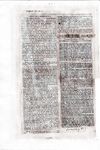Template:Style P-HPB SB. Title wanted
The Spiritualist. April 23, 1875
A Metaphysical Convict.
Sir—Since my name became more or less prominent in connection with the investigation of Spiritualism, I have received many queer letters, but the one herewith enclosed is the strangest of all It comes from a man confined in the Connecticut State Prison, for a murder committed over twenty years ago. He was educated for the Episcopal ministry, and is a person of very fine intellectual capacities, if one may judge not merely by his conversation, but also by his phrenological and physiognomical developments. I met him for the first and only time, a few days ago, while passing through the prison in company with several ladies; and, being introduced by the courteous warden, Mr. Hewes, we chopped logic for a quarter of an hour. Ha had read sundry notices of my forthcoming book, People from the Other World, and this fact caused our talk to take the turn it did. . . .
Henry S. Olcott.
Hartford, March 19th, 1875.
Dear Sir,—I was not at all prepared for the little encounter of logic with you this afternoon, and since I could not present my views in very precise form in conversation, I will try what I can do with a pen. I think the discussion may be of interest to the “general reader.”
The point of philosophy I wanted to advance is that all real truth, and all that we can really know, is of the negative order, like the axioms of mathematics; while all that we can say of things of a positive nature and order—even of the existence of an external world, which is the nearest thing to positive reality—is that it appears to be real or true. Hence many things are apparently and practically true which we know can not be true. We can never cease to feel and act precisely like free agents,—we actually believe in freedom—though we know that whatever is to be, will be, and that there is no power in all the universe to produce events that are not. Bear in mind that there is never a question of what a thing is “in itself,” for the very farthest we can go is to ask how it appears to us. We may say that a thing appears real, but cannot say, using terms with philosophical accuracy, that anything is real.
Hence the only question with regard to Spiritualism, is simply whether it is an apparent and practical truth; for we may know with absolute certainty, if we have enough of the faculty of reason to be able to know anything, that no doctrine of a positive nature can be really true. Utility is a very important element in determining what really seems true. We are not to suppose that men are endowed with any new sense faculties in these latter days, but may suppose that old delusions are ever taking new forms. There is an old form of the doctrine of Spiritualism that is essential to morality, as the assumption of its truth underlies all our notions of right and wrong. Materialism can furnish no valid basis for such notions. It finds their basis in a Spiritualism latent in our own nature. Yet to suppose the doctrine an absolute truth, because it underlies our moral notions, is just as destructive of genuine morality as materialism can be. Materialism, though but a negation, can furnish us with a semblance of morality, and any positive truth that is held as absolute, can do no more. If we would have a genuine morality, we must take both kinds of truth at their own worth and value, neither mistaking the apparent and practical truth for real and absolute, nor the negative and real truth for the practical.
To make the modern form of Spiritualism of any practical value, so that we may concede so much of it as to say that it appears to be true, you must give us something more than marvels that appeal only to our wonder, aid communications from the departed that add nothing to out stock of useful knowledge. All this, if we take the sensible view of it, but makes it appear a senseless and debating superstition. The attempt ta make things appear beautiful and true that are not merely useless, but positively harmful, is a mark of a low order of wisdom. To the young lady who spoke about “disordered stomach,” I would say:—
